雅思考试主要是通过对考生听、说、读、写四个方面英语能力的考核,综合测评考生的英语沟通运用能力,实现“沟通为本”的考试理念。对于雅思考生来说,也有很多考试难点和政策盲区需要帮助解答。今天雅思无忧网小编准备了雅思口语TV和films范文 谁有总结雅思作文的一些基本短语?,希望通过文章来解决雅思考生这方面的疑难问题,敬请关注。

谁有总结雅思作文的一些基本短语?
be next to 紧邻
turn left/right 左转/右转
go up/down 向上(北)/向下(南)
go back/back/back up 向亩灶回走
go east/west/south/north 向迅陵扮东/南/西/北
go on/along…till you meet…沿…一直走,直到…
be on *’s left/right 在某人的左边/右边
be the first/second/third from the left/right 从左/右数第一/二/三个
directly opposite 和…相对
be located behind/in front of 坐落在…的前面/后面
be on the corner of A street and B street 在A和B街交汇的拐角处
be in the corner of 在…的角落里
ground floor (英)首层
wing 配楼/建筑的一部分
annex 配楼/建筑的附属建筑
basement 地下室/第一层
twin building 由两个完全相同的部分构成的建筑
landmark 标志性的建筑
block/complex 由若干个建筑构成的建筑群/街区
stair 楼梯
step 台阶
wheel chair access 无台阶的/残疾人用
aisle 过道
intersection/crossroad 十字路口
a fork on the road 分叉路口
a T road 丁字路口
intersection/crossroads/junction/clover-leaf 立交桥
二、 描述人的外表、衣着
gender 性别汪亮
hair color 头发颜色
bald 秃头
beard 落腮胡
moustache/mustache 上唇上的小胡子
wearing glasses 戴眼镜
contact lenses 隐型眼镜
top 上衣
pullover 套头毛衣
be in red/green/dark 身着红/绿/黑色衣服
be far form
距离某处近 gender
性别 be nearby
距离某处远 Hair color
头发颜色 go straight across/to/through
径直走过/向/过 Bald
秃头 cross(over)
穿过(某条街道) Beard
落腮胡 be next to
紧邻 Moustache/mustache
上唇上的小胡子 turn left/right
左转/右转 Wearing glasses
戴眼镜 go up/down
向上(北)向下(南) Contact lenses
隐形眼镜 go back/back/back up
向回走 top
上衣 go east/west/south/north
向东/南/西/北 Pullover
套头毛衣 go on/along…till you meet
沿…一直走,直到… Be in red/green/dark
身着红/绿/黑色衣服 be on *’s lest/right
在某人的左边/右边 Suit
(男)西服;(女)套装 be the first/second/third from the left/right
从左/右数第一/二/三个 Wear/be in tie
戴领带 directly opposite
和….相对 Swearter
套头衫,运动衫 be located behind/in front of
坐落在…的前面/后面 Slim
苗条的 be on the corner of A street and B street
在A和B街的拐角处 Stout
结实,矮胖的 be in corner of
在..的角落里 blond
金发碧眼的 ground floor
(英)首层
旅游出行
wing
配楼/建筑的一部分 travel agency
旅行社 annex
配楼/主楼的附属建筑 flight number
航班号 basement
地下室/第一层 take off
起飞 twin building
由两个完全相同的部分构成的建筑 land
降落 landmark
标志性的建筑 check in
办理登机手续 block/complex
由若干建筑构成的建筑群/街区 motel
汽车旅馆 stair
楼梯 hostel
青年旅馆 step
台阶 book the ticket
订票 wheel chair access
无台阶的/残疾人用 passport
护照 aisle
过道 credit card
签证 intersection/crossroad
十字路口 driving license/licence
信用卡 a fork on the road
分岔路口 expire
驾照v.驾照,护照等过期 a T road
丁子路口 platform
站台 intersection/crossroads/junction/clover-leaf
立交桥 museum
博物馆 souveair
纪念品 art gallery
画廊 hiking
徒步旅行,攀登 hitch-hike
搭便车旅行 surfing
冲浪 sking
滑雪 bag-packer
肩背大包进行自助旅行的人
学校生活之学习篇
学校生活之生活篇
enrdment
注册 campus
校园 selective/elective/option
选修课 common room
(英)师生公用的休息室 required course/compulsory course
必修课 canteen
餐厅 course arrangement
课程安排 dining hall
食堂 application
申请 cafeteria
自助小餐厅 application form
申请表 accommodation
住宿 letter of recommendation
推荐信 dorm/dormitory
宿舍 programme/program
某一专业的课程总称 dormmate/roommate
合租一间宿舍/公寓/房屋的人 school
学院 parking lot
停车场 graduate school
研究生院 parking regulations
停车规定 undergraduate
本科 shopping mall
购物中心 postgraduate
研究生 teaching building
教学楼/教务楼 school of Arts and Sciences
文理学院 lecture theatre
大教室/阶梯教室 score
成绩 administrating office/admin office
行政办公室 credit
学分 laboratory/lab
实验室 degress
学位 student union
学生会 asses*ent
对学生的学习情况进行评估 society
学生社团 handout
上课老师发的印刷品 club
学生俱乐部 assignment
作业 student account
银行种的学生帐户 presentation
针对某一专题进行的发言 current account
现金帐户 project
需要学生进行独立钻研的课外课题 chequebook/checkbook
支票本 paper/thesis/disscrtation
论文/硕士论文/博士论文 withdraw cash
取现 essay
短论文 deposit money in a bank
存钱 journal
周记/每周要做的作业
学校生活之课题研究篇
participation
出勤 research
研究 lecture
老师的讲课 deadline
最后期限 tutorial
助教的辅导 poll
(民意)调查 TA(Teaching Assistant)
助教 survey
调查 office hour
教授与学生面谈的时间 hypothesis
假设 coordinator
课程协调人/班主任 statistics
统计 professor
教授 statistically valid
统计学上有效的 associate professor
副教授 data/datum
数据 assistant professor
助理教授 investigation
调查 lecturer
讲师 quantitative
数量的/定量的 dean
系主任 significant difference
显著的差异 counselor
辅导老师 interview
访谈 adviser
导师 respondents/interviewee
回答调查问题者/被访谈的人 mentor
导师 questionnaire
调查文卷 president
校长 multiple choice questions
选择题 chancellor
名誉校长 *yze/*yse data
分析数据 faculty
教职员工的总称 results
结果 conclusion
结论 interpretation
解释/阐释 opinion
观点
1. 开头万能公式一:名人名言 KvJ中国英语学习网
有人问了,“我没有记住名言,怎么办?尤其是英语名言?”,很好办:编! KvJ中国英语学习网
原理:我们看到的东西很多都是创造出来的,包括我们欣赏的文章也是,所以尽管编,但是一定要听起来很有道理呦!而且没准将来我们就是名人呢!对吧? KvJ中国英语学习网
经典句型: KvJ中国英语学习网
A proberb says, “ You are only young once.” (适用于已记住的名言) KvJ中国英语学习网
It goes without saying that we cannot be young forever. (适用于自编名言) KvJ中国英语学习网
更多经典句型: KvJ中国英语学习网
As everyone knows, No one can deny that… KvJ中国英语学习网
2. 开头万能公式二:数字统计 KvJ中国英语学习网
原理:要想更有说服力,就应该用实际的数字来说明。 KvJ中国英语学习网
原则上在议论文当中十不应该出现虚假数字的,可是在考试的时候哪管那三七二十一,但编无妨,只要我有东西写就万事大吉了。所以不妨试用下面的句型: KvJ中国英语学习网
According to a recent survey, about 78.9% of the college students wanted to further their study after their graduation. KvJ中国英语学习网
看起来这个数字文邹邹的,其实都是编造出来的,下面随便几个题目我们都可以这样编造: KvJ中国英语学习网
Honesty KvJ中国英语学习网
根据最近的一项统计调查显示,大学生向老师请假的理由当中78%都是假的。 KvJ中国英语学习网
Travel by Bike KvJ中国英语学习网
根据最近的一项统计调查显示,85%的人在近距离旅行的时候首选的交通工具是自行车。 KvJ中国英语学习网
Youth KvJ中国英语学习网
根据最近的一项统计调查显示,在某个大学,学生的课余时间的70%都是在休闲娱乐。 KvJ中国英语学习网
Five-day Work Week Better than Six-day Work? KvJ中国英语学习网
根据最近的一项统计调查显示,98%的人同意每周五天工作日。 KvJ中国英语学习网
更多句型: KvJ中国英语学习网
A recent statistics shows that … KvJ中国英语学习网
2. 结尾万能公式: KvJ中国英语学习网
1. 结尾万能公式一:如此结论 KvJ中国英语学习网
说完了,毕竟要归纳一番,相信各位都有这样的经历,领导长篇大论,到最后终于冒出个“总而言之”之类的话,我们马上停止开小差,等待领导说结束语。也就是说,开头很好,也必然要有一个精彩的结尾,让读者眼前一亮,这样,你就可以拿高分了!比如下面的例子: KvJ中国英语学习网
Obviously(此为过渡短语), we can draw the conclusion that good manners arise from politeness and respect for others. KvJ中国英语学习网
如果读者很难“显而见之”,但说无妨,就当读者的眼光太浅罢了! KvJ中国英语学习网
更多过渡短语: KvJ中国英语学习网
to sum up, in conclusion, in brief, on account of this, thus KvJ中国英语学习网
更多句型: KvJ中国英语学习网
Thus, it can be concluded that…, Therefore, we can find that… KvJ中国英语学习网
2. 结尾万能公式二:如此建议 KvJ中国英语学习网
如果说“如此结论”是结尾最没用的废话,那么“如此建议”应该是最有价值的废话了,因为这里虽然也是废话,但是却用了一个很经典的虚拟语气的句型。拽! KvJ中国英语学习网
Obviously, it is high time that we took some measures to solve the problem. KvJ中国英语学习网
这里的虚拟语气用得很经典,因为考官本来经常考这个句型,而如果我们自己写出来,你说考官会怎么想呢? KvJ中国英语学习网
更多句型: KvJ中国英语学习网
Accordingly, I recommend that some measures be taken. KvJ中国英语学习网
Consequently, to solve the problem, some measures should be taken.
写作绝招 KvJ中国英语学习网
写作的“七项基本原则”: KvJ中国英语学习网
一、 长 短 句原则 KvJ中国英语学习网
工作还得一张一驰呢,老让读者读长句,累死人!写一个短小精辟的句子,相反,却可以起到画龙点睛的作用。而且如果我们把短句放在段首或者段末,也可以揭示主题: KvJ中国英语学习网
As a creature, I eat; as a man, I read. Although one action is to meet the primary need of my body and the other is to satisfy the intellectual need of mind, they are in a way quite similar. KvJ中国英语学习网
如此可见,长短句结合,抑扬顿挫,岂不爽哉?牢记! KvJ中国英语学习网
强烈建议:在文章第一段(开头)用一长一短,且先长后短;在文章主体部分,要先用一个短句解释主要意思,然后在阐述几个要点的时候采用先短后长的句群形式,定会让主体部分妙笔生辉!文章结尾一般用一长一短就可以了。 KvJ中国英语学习网
二、 主 题 句原则 KvJ中国英语学习网
国有其君,家有其主,文章也要有其主。否则会给人造成“群龙无首”之感!相信各位读过一些破烂文学,故意把主体隐藏在文章之内,结果造成我们稀里糊涂!不知所云!所以奉劝各位一定要写一个主题句,放在文章的开头(保险型)或者结尾,让读者一目了然,必会平安无事! KvJ中国英语学习网
特别提示:隐藏主体句可是要冒险的! KvJ中国英语学习网
To begin with, you must work hard at your lessons and be fully prepared before the exam(主题句). Without sufficient preparation, you can hardly expect to answer all the questions correctly. KvJ中国英语学习网
三、 一 二 三原则 KvJ中国英语学习网
领导讲话总是第一部分、第一点、第二点、第三点、第二部分、第一点… 如此罗嗦。可毕竟还是条理清楚。考官们看文章也必然要通过这些关键性的“标签”来判定你的文章是否结构清楚,条理自然。破解方法很简单,只要把下面任何一组的词汇加入到你的几个要点前就清楚了。 KvJ中国英语学习网
1)first, second, third, last(不推荐,原因:俗) KvJ中国英语学习网
2)firstly, secondly, thirdly, finally(不推荐,原因:俗) KvJ中国英语学习网
3)the first, the second, the third, the last(不推荐,原因:俗) KvJ中国英语学习网
4)in the first place, in the second place, in the third place, lastly(不推荐,原因:俗) KvJ中国英语学习网
5)to begin with, then, furthermore, finally(强烈推荐) KvJ中国英语学习网
6)to start with, next, in addition, finally(强烈推荐) KvJ中国英语学习网
7)first and foremost, besides, last but not least(强烈推荐) KvJ中国英语学习网
8)most important of all, moreover, finally KvJ中国英语学习网
9)on the one hand, on the other hand(适用于两点的情况) KvJ中国英语学习网
10)for one thing, for another thing(适用于两点的情况) KvJ中国英语学习网
建议:不仅仅在写作中注意,平时说话的时候也应该条理清楚! KvJ中国英语学习网
四、 短语优先原则 KvJ中国英语学习网
写作时,尤其是在考试时,如果使用短语,有两个好处:其一、用短语会使文章增加亮点,如果老师们看到你的文章太简单,看不到一个自己不认识的短语,必然会看你低一等。相反,如果发现亮点—精彩的短语,那么你的文章定会得高分了。其二、关键时刻思维短路,只有凑字数,怎么办?用短语是一个办法!比如: KvJ中国英语学习网
I cannot bear it. KvJ中国英语学习网
可以用短语表达:I cannot put up with it. KvJ中国英语学习网
I want it. KvJ中国英语学习网
可以用短语表达:I am looking forward to it. KvJ中国英语学习网
这样字数明显增加,表达也更准确。 KvJ中国英语学习网
五、 多实少虚原则 KvJ中国英语学习网
原因很简单,写文章还是应该写一些实际的东西,不要空话连篇。这就要求一定要多用实词,少用虚词。我这里所说的虚词就是指那些比较大的词。比如我们说一个很好的时候,不应该之说nice这样空洞的词,应该使用一些诸如generous, humorous, interesting, *art, gentle, warm-hearted, hospital 之类的形象词。再比如: KvJ中国英语学习网
走出房间,general的词是:walk out of the room KvJ中国英语学习网
但是小偷走出房间应该说:slip out of the room KvJ中国英语学习网
小姐走出房间应该说:sail out of the room KvJ中国英语学习网
小孩走出房间应该说:dance out of the room KvJ中国英语学习网
老人走出房间应该说:stagger out of the room KvJ中国英语学习网
所以多用实词,少用虚词,文章将会大放异彩! KvJ中国英语学习网
六、 多变句式原则 KvJ中国英语学习网
1)加法(串联) KvJ中国英语学习网
都希望写下很长的句子,像个老外似的,可就是怕写错,怎么办,最保险的写长句的方法就是这些,可以在任何句子之间加and, 但最好是前后的句子又先后关系或者并列关系。比如说: KvJ中国英语学习网
I enjor music and he is fond of playing guitar. KvJ中国英语学习网
如果是二者并列的,我们可以用一个超级句式: KvJ中国英语学习网
Not only the fur coat is soft, but it is also warm. KvJ中国英语学习网
其它的短语可以用: KvJ中国英语学习网
besides, furthermore, likewise, moreover KvJ中国英语学习网
2)转折(拐弯抹角) KvJ中国英语学习网
批评某人缺点的时候,我们总习惯先拐弯抹角说说他的优点,然后转入正题,再说缺点,这种方式虽然阴险了点,可毕竟还比较容易让人接受。所以呢,我们说话的时候,只要在要点之前先来点废话,注意二者之间用个专这次就够了。 KvJ中国英语学习网
The car was quite old, yet it was in excellent condition. KvJ中国英语学习网
The coat was thin, but it was warm. KvJ中国英语学习网
更多的短语: KvJ中国英语学习网
despite that, still, however, nevertheless, in spite of, despite, notwithstanding KvJ中国英语学习网
3)因果(so, so, so) KvJ中国英语学习网
昨天在街上我看到了一个女孩,然后我主动搭讪,然后我们去咖啡厅,然后我们认识了,然后我们成为了朋友…可见,讲故事的时候我们总要追求先后顺序,先什么,后什么,所以然后这个词就变得很常见了。其实这个词表示的是先后或因果关系! KvJ中国英语学习网
The snow began to fall, so we went home. KvJ中国英语学习网
更多短语: KvJ中国英语学习网
then, therefore, consequently, accordingly, hence, as a result, for this reason, so that KvJ中国英语学习网
4)失衡句(头重脚轻,或者头轻脚重) KvJ中国英语学习网
有些人脑袋大,身体小,或者有些人脑袋小,身体大,虽然我们不希望长成这个样子,可如果真的是这样了,也就必然会吸引别人的注意力。文章中如果出现这样的句子,就更会让考官看到你的句子与众不同。其实就是主语从句,表语从句,宾语从句的变形。 KvJ中国英语学习网
举例:This is what I can do. KvJ中国英语学习网
Whether he can go with us or not is not sure. KvJ中国英语学习网
同样主语、宾语、表语可以改成如下的复杂成分: KvJ中国英语学习网
When to go, Why he goes away… KvJ中国英语学习网
5)附加(多此一举) KvJ中国英语学习网
如果有了老婆,总会遇到这样的情况,当你再讲某个人的时候,她会插一句说,我昨天见过他;或者说,就是某某某,如果把老婆的话插入到我们的话里面,那就是定语从句和同位语从句或者是插入语。 KvJ中国英语学习网
The man whom you met yesterday is a friend of mine. KvJ中国英语学习网
I don’t enjoy that book you are reading. KvJ中国英语学习网
Mr liu, our oral English teacher, is easy-going. KvJ中国英语学习网
其实很简单,同位语--要解释的东西删除后不影响整个句子的构成;定语从句—借用之前的关键词并且用其重新组成一个句子插入其中,但是whom or that 关键词必须要紧跟在先行词之前。 KvJ中国英语学习网
6)排比(排山倒海句) KvJ中国英语学习网
文学作品中最吸引人的地方莫过于此,如果非要让你的文章更加精彩的话,那么我希望你引用一个个的排比句,一个个得对偶句,一个个的不定式,一个个地词,一个个的短语,如此表达将会使文章有排山倒海之势! KvJ中国英语学习网
Whether your tastes are modern or traditional, sophisticated or simple, there is plenty in London for you. KvJ中国英语学习网
Nowadays, energy can be obtained through various sources such as oil, coal, natural gas, solar heat, the wind and ocean tides. KvJ中国英语学习网
We have got to study hard, to enlarge our scope of knowledge, to realize our potentials and to pay for our life. (气势恢宏) KvJ中国英语学习网
要想写出如此气势恢宏的句子非用排比不可! KvJ中国英语学习网
七、 挑战极限原则 KvJ中国英语学习网
既然是挑战极限,必然是比较难的,但是并非不可攀! KvJ中国英语学习网
原理:在学生的文章中,很少发现诸如独立主格的句子,其实也很简单,只要花上5分钟的时间看看就可以领会,它就是分词的一种特殊形式,分词要求主语一致,而独立主格则不然。比如: KvJ中国英语学习网
The weather being fine, a large number of people went to climb the Western Hills. KvJ中国英语学习网
Africa is the second largest continent, its size being about three times that of China. KvJ中国英语学习网
如果您可一些出这样的句子,不得高分才怪!
写作绝招 KvJ中国英语学习网
文章主体段落三大杀手锏: KvJ中国英语学习网
一、举实例 KvJ中国英语学习网
思维短路,举实例!提出一个观点,举实例!提出一个方案,举实例!而且者也是我们揭示一个观点最好的方式,任何情况下,只要我们无法继续文章,不管三七二十一,尽管举例子! KvJ中国英语学习网
In order to attract more customers, advertisers have adopted every possible stimulative factor in making ads, such as sound, light, colors, cartoon films and human performance. For instance, to advertise a certain food, advertisers will ask an actor or actress to sit at a table and devour the seemingly delicious food while they film him or her. KvJ中国英语学习网
更多句型: KvJ中国英语学习网
To take … as an example, One example is…, Another example is…, for example KvJ中国英语学习网
二、做比较 KvJ中国英语学习网
方法:写完一个要点,比较与之相似的;又写完一个要点,再比较与之相反的; KvJ中国英语学习网
世界上没有同样的指纹,没有相同的树叶,文章亦同,只有通过比较,你才会发现二者的相同点(through comparison)和不同点(through contrast)。下面是一些短语: KvJ中国英语学习网
相似的比较: KvJ中国英语学习网
in comparison, likewise, similarly, in the same manner KvJ中国英语学习网
相反的比较: KvJ中国英语学习网
on the other hand, conversely, whereas, while, instead, nevertheless, in contrast, on the contrary, compared with …, … KvJ中国英语学习网
三、换言之 KvJ中国英语学习网
没话说了,可以换一句话再说,让你的文章在多一些字,或者文邹邹地说,是让读者更充分的理解你的观点。 KvJ中国英语学习网
实际就是重复重复再重复!下面的句子实际上就三个字 I love you! KvJ中国英语学习网
I am enthusiastic about you. That is to say, I love you. KvJ中国英语学习网
I am wild about you. In other words, I have fallen in love with you. KvJ中国英语学习网
或者上面我们举过的例子: KvJ中国英语学习网
I cannot bear it. KvJ中国英语学习网
可以用短语表达:I cannot put up with it. KvJ中国英语学习网
因此可以这样说:I cannot bear it. That is to say, I cannot put up with it or I am fed up with it. KvJ中国英语学习网
更多短语: KvJ中国英语学习网
in more difficult language, in simpler words, put it more simply
作文写好了后,你检查了吗? 只要坚持注意以下几点,相信你的写作会有意想不到的收获。
1.是否使用了正确的语法结构,比方说,动词时态一致、主谓一致、用词准确、词性(尤其是名词、动词、形容词)、名词单复数、冠词错误和介词错误。
2.句式是否有变化 (如各种从句的使用、分词结构等 )
3.使用了一定的词汇量 ( 如用同义词或词组来避免过多的重复)
4.标点、拼写没有错误。
5.在每段的主题句中都表明了这个段落的中心思想,所有扩展句都紧扣主题。
6.Obviously(此为过渡短语), we can draw the conclusion that good manners arise from politeness and respect for others.
更多过渡短语: to sum up, in conclusion, in brief, on account of this, thus
更多句型: Thus, it can be concluded that…, Therefore, we can find that…
Obviously, it is high time that we took some measures to solve the problem.
更多句型:
Accordingly, I recommend that some measures be taken.
Consequently, to solve the problem, some measures should be taken
如何准备雅思考试?
雅思总分7.5分,阅读9分高分心得
总的思路
对于准备任何一门外语考试,均可以从两个方面入手:词汇+真题;其中词汇的主要作用是为随后的做题提供扎实的基础,而真题则是钻研考试思路的全部依据。
我在苏州6月20日这次考试中的结果显示出了词汇上准备的不足,各分项分数如下:阅读9分,听力7.5分,写作6.5分,口语6分,在写作和口语上尤其突出。
词汇
对于愿意在雅思考试上追求高分,或者意在通过本次考试进一步提升自己英语水平的同学,扎实地记忆雅思词汇至关重要。
我们在背诵词汇时,往往感到枯燥无聊,很快就会怀疑背单词的到底有什么意义,于是乎就半途而废(难怪很多单词书的第一个单词是abandon)。现在看来,我的教训是要懂得坚持的可贵:当你坚持背到一本书三分之一的时候,其实大部分人都已经放弃了;而一旦你将整本词汇书掌握完毕后,7.5分以上的目标绝不会显得遥不可及。先说说词汇对各个分项的意义所在:
1.听力:
在第二和第三部分的填空题中,相当一部分的空需要填写的是雅思词汇,不去背诵单词书而仅仅凭之前的积累是不够的。6月20日雅思考试中:part 3考的香料的历史作用,其中说香料的功效之一是治愈关节炎(arthritis),我抓住了发音,甚至知道是“关节炎”这个意思,由于词汇拼写记忆不牢,颇为抓狂。
2.写作:
有一项关于词汇丰富量的评分项(lexical resources),雅思范文中基本上生词都是雅思词汇书中所包含的,因而如果对这些词汇不熟悉的话,枉谈熟练的使喊举闹用。在了解词汇基本含义的基础上,通过阅读范文掌握在特定语境下的运用。
3.口语:
上同样和写作相同的道理,能够在和考官的交流中运用相对生僻而准确的词汇来表达准确的意思。比如说good一意在不同的语境下可以用competent, charming, harmonious, well-regulated等。
4.阅读:
阅读相对来讲受到词汇的影响较小,不理解的词汇有时不会影响对整体段落大意的理解,或者不一定被考到。但是如果一句话中出现某个高端的词汇描述了作者的态度,或者某个事物的性质,如果你不了解的话很可能就无法掌握作者的观点,在随后的判断题中就只能瞎蒙了。
真题
真题的作用就是将雅思考试的出题思路深刻的领悟,在掌握思路的情况下,没有任何必要看所谓的机经。所以做一遍真题肯定无法达到以上目的,最多只能够知道雅思考试的题型是什么样的。建议大家*两份真题(剑三到剑七),用途如下:
剑三剑四:了解雅思题型特点,找回做英语题的感觉;具体来将就是第一遍做完所有试卷要把所有的题型熟悉,总结常错的地方,并有初步的思路如何应对它;第二遍再做的郑罩时候就是验证自己的应对思路,有不合适的地方重新改变思路,并在下一阶段再次验证和反思。
剑五剑六:剑五剑六的特点是题型更符合近年来的考试趋势,同时在难度上要比剑三剑四上一个层次;两本书的作用就在于形成自己的解题思路,这个阶段要给自己定下目标,我要在某个阶段结束前正确率达到什么水平,因而每次做完题目都要去反思,改正并在下一次做题时区参考上次犯的错误。
剑七:据说是最像现在考试的试卷,用于考前两周的模拟试题;可以结合答做原来总结的错误类型和思路来做,注意把握时间。
分项建议
阅读:
将每次做完一篇文章后当时不懂的句子划出来,在结束做题后仔细分析句式结构;通过积累一段时间后基本上能够做到凌波微步,不用因为看不懂某一句话停下来回读了;
听力:
1.快速预读的机制很关键,主要原则是在最短的时间内掌握最多有用的信息:
a.选择题,先掌握题干的动宾结构,随后去对比和比较各个选择支中相同和不同的成份,在听的过程中要注意把握说话者的观点;
b.填空题,把握前面和后面的动词和名词,一旦听到与之对应的同意转换,立刻将答案写上。
2.按照题目所给数字顺序做题:形成良好的做题节奏,根据节奏做完一题后一段时间没有听到下一题,将其果断放弃。
写作:
1.推荐顾家北的《雅思写作思路剖析》,将写作思路看完后,在随后的每个专题动手写一篇,其余的看一看积累素材和结构;
2.养成自己惯用的写作思路和句子,便于节省时间。本人在议论文常用开篇如下:The new era has witnessed the rise of …, there is no denying towards its significance of …, while it raises much concern as…. This essay aims to give an overview of the debatable issue by throwing light on both sides and offer some responsible solutions。
3.考前注意将大作文和小作文一起写,防止花时间太多在小作文上导致随后未完成任务。我在那场考试就是小作文过于精雕细琢,导致写大作文只有三十四分钟。
口语:
最大的教训是准备口语应该先准备回答问题的基本思路,而不是先准备回答问题的内容;例如:回答“How do you like transportations in your city?”,我们应该有逻辑结构的展开“To the best of my knowledge, the transportation is by no means….As can be mainly seen in the fact that…It also deserves mention that…”在掌握框架之后,再去向里面填充回答问题的具体内容。
6月26日下午雅思口语题有些什么?
虽然不知道当时你那里是什麽·不过这个是在环球雅思站上找的·可以参考哈
Part one:
这一部分的考题是6月28,7月悉历5和12日最重要也是在过去几次考试出现次数最高的,7月碧谨24,26的同学们一定要全部准备。这是最最重要。。。。悔陆基
Do you love cooking , why?
who does the housework?
Do you live in a flat or house ?
what can you see from the windows?
What is special at your home?
What is on the wall at your home?
Is the environment of your home good for the children?
What evening activity do people do in your country?
Do you love reading?
What kinds of book do you like to read?
What are the benefits in reading?
What is your reading hobby?
How to get used to using internet quickly?
Which is the most attractive to you, TV, internet or books?
Will books be replaced by the E-books?
What is your way to get news, magazine, TV, or internet?
What qualities should a journalist have in news?
What abilities do you have if you were to be reporter?
Have you known some famous journalist?
Are people being affected by mass media, why?
what are the consequence if a newspaper office copy the news or report from other one and how to solve it ?
What are the pros and cons of teamwork or individual work?
What are the pros and cons of using internet and mobile phone?
How can internet and mobile phone can people’s life?
下面的考题是我对24号26号考试的预测。
Job/study
Are you student or working?
What kind of company are you working in?
What are the advantages and disadvantages of your job?
What do you want to learn in the future, why , who is going to teach you and the way of teaching?
Do you want to work in a big pool or *all pool?
Do you think there should be a age-limit on job?
Is it easy for college student to get jobs?
What are the difficulties in getting jobs?
Why some eldly people get back to school for education?
Housework
Who does the housework in your family?
What housework do you like and dislike?
What changes are brought by modern technology into housework?
Teenager
What are the differences between the people nowadays and the past?
What are the attitudes of yougsters to the eldly?
Do peple go to the gym, what are the advantages of going there?
what sort of equipments are availble ?
what are the difference of sports now and in the past, are people aware of the importance of health?
What the meaning of your name , and is there any special celebration for naming the kid?
Music
What music do you like? Why?
What musical instrument do you like?
Are there any friends around you playing some instruments, like piano or guitar?
Have you ever listened to someone playing a musical instrument?
What musical instrument do you enjoy most and why?
Can you play any musical instrument?
Do you often go to the concert?
Shopping
Do you like shopping?
Who does the shopping in your family?
What do you often buy when you go shopping?
What don’t you like when you go shopping?
Where do you like to go shopping?
What style of shopping do you like?
Clothing
What kind of clothes do you like?
What’s the difference between the opinions of men and women on clothes?
Do you like buying clothes?
Do you often wear formal or informal clothes?
Do you think that color is important when you buy clothes?
Sport
What sports are popular among Chinese people?
Should we teach sports to children? Why?
What is the role of sports?
Do you think sports can help you relieve your mood?
Film
Do you like to watch films in the cinema or at home?
Why do you like to watch films?
What kind of films do you like?
How often do you go to the cinema?
What’s the difference between American films and Chinese films?
Computer
What do you do with computers?
Do you think that children should learn to use computers?
Do you think that life is better with computers?
When did you begin to use computers?
What’s the influence of computers on you?
Living place
Where are you living now?
Do you like your living environment?
Is it good or bad for children?
Is there anything for improvement?
What can you see from your windows?
What is hanging on the wall in your house?
Photography
Do you like taking photos?
On what kind of situations do you take photos?
Could you tell me one of your happy experiences of taking photos?
Relax
What do you do in your leisure time?
What relaxation do people around you like?
What kind of activities do people of your country do for relaxation?
Why do people need leisure?
What will you do if you have extra spare time?
Drawing
Do you like drawing?
What are the benefits of drawing?
What are the benefits of drawing for *s?
Newspaper
When did you begin to read newspaper?
What’s the difference between Chinese newspapers?
Gift
When do people send gifts in China?
What did you give and receive?
What gifts are popular in China?
What have you given to others and who did you send gifts to?
Art
Do you think the art is important to life?
Can you give an example of arts you learn?
What kind of art do you like?
What kind of art experience did you have when you were young?
What kind of art are you good at?
Weekend
Is weekend important to people?
What do people do on weekend?
Do you think people should be asked to work on weekends?
Do you think people should get more money if they work on weekends?
Which day do you like more on weekend?
What do you often do on that day?
Flowers
Do Chinese people like to give flowers as a gift?
Do flowers have any special meanings in China?
On what occasions do Chinese send flowers to each other?
What are the functions of flowers at weddings and restaurants?
When did you last send flowers?
Part two:
口语考试的重复性是很大的,现在ETS没有时间更新题库,忙着准备机考,第二部分考试总的原则就是“人,物,事件,地点,媒体”,只要同学们按照我的课堂讲过的TSE方法以及公式去准备5篇范文,任何话题都可以套,详细请看我的公共邮箱和博客。下面的题,前面的是重点考题,括号里的是题目的变形,就是可以换来用的,同学们多发挥想像力。比如下面第一题:要你描述一本书,我在课堂讲过,这类题形是知识类的实物题,从“读者,欢迎度,内容,读后感等等入手”,这本书的内容可不可以与电影,网站一样呢,当然可以。
1. A book you have read recently(magazine, website , a film)
2. A game (not sport) you played when you were a child(a physical activity)
3. A photo(a good experience in your life)
4. A good law in China
5. Some interesting news( From the books ,website, internet, or TV program)
6. A gift you gave( computer, family event ,wedding, something expensive , a good experience)
7. A tourist attraction( a place with a lot of water, a place that is polluted, a city you have visited , a jounery you have taken)
8. a person who is good at his/her job (A school friend ,teacher, eldly person,teenager )
9. An organisation(A recent change in your life ,school , a place you have worked before)
10. A show/performance you watched
11. Something you would like to learn(the foreign language you would like to learn besides English )
12. Someone you would like to spend time with(An old person you respect
13. Advice
14. Shopping centre( library, school, museum ,a place you would like to go)
15 a family (not yours)
Part three:
第三部分是决定同学们高分的标准,记住从国家,社会与个人的角度去阐明,每个问题都要保持5句以上的回答,请7月24,26号同学们务必全部准备好。
1Restaurant
(Your idea on fast food or the food cooked at home)
2Website:
The pros and cons of Internet?
What are the differences for various kinds of people in using internet?
How old people learn to use it?
3Project
Do you think team spirit is important, how to achieve it?
4City:
do you think traveling can be educational?
What are the pollutions mainly in China, how to solve it?
5Advice:
Do you usually get advice from your family or your friends?
Do you always give the advice to the young people?
Do you think what kind of personality the people given advice should have?
6Friends:
What is your standard for choosing friends?
What makes a good friendship?
How can you maintain friendship?
7A person who u are similar to
Does money really can break up friendship?
What are the pressures facing people nowadays?
8A foreign language (besides English):
What are the advantages of learning foreign language?
What are the difficulties?
9Shop:
The pros and cons of E-shopping and ordinary shopping?
Why are males not likely to go shopping?
How often do you go shopping?
What is your opinion of bargaining?
Is it good for children to go shopping?
10Family events (birthday, or a family dinner)
who is your favorite member in the family, why?
Tell me the influence your grandpa had on you?
The influence of your grandpa’s advice now and in the past?
Who is the leader in your family, why?
11Chinese traditional culture
What is your most cherished culture?
How can Chinese people consider the traditional culture?
Should the old building be replaced by modern one?
12Magazine:
What is your favorite magazine or newspaper?
The difference between magazine and newspaper?
What are the influence on people from the gossip of mass media
13Wedding
Compare modern wedding with tradition one in your culture
Why it's important, Will it change?
What are the differences between the family party now and in the past?
14Teenager
What are the influences of teenager on society?
How do teenagers treat the old people?
Compare the teenager now and in the past?
15Visitor
How do you like to treat your guest or friends at your home?
What are the advantages and disadvantages of living at friend’s home?
What you do prefer to live in , hotel or home ,why?
In what way should the service be improved at hotels?
16A place with a lot of water
What are the importance and usage of water?
Why we use more water now than the past?
What hazards of the inequality of water resources?
What can be done by the government to improve the situation?
Why do people like live near by the water?
What can they do there?
Why children like swimming?
17 An equipment (besides computer)
(the pros and cons of using computer?
Are the children allowed to play game or log on the net by parents?
18 Physical activities
Do we need sports?
Why government advertises people should do more sports?
The differences between the sports nowadays and the past?
Why modern people are not willing to do sports?
19 a person who work well in his job
The relationships between the age and career?
Should we forbid the retired age?
20 laws
Do you think it is important to set up the law?
Do you think laws are all fair?
Do people like engaging in this kind or job?
Are Chinese people abide by the law?
Should we need an international law?12 a place where you can listen to music
Can music help release the mood?
Do you think we should teacher children to play musical instrument?
21Animal
What is your favorite animal?
What can you learn from animals?
Are you the vegetarian?
Should we put the animal in the zoo or in nature?
22Recent changes in your life
What kind of job you like to do in the future?
Do you like trying new things ?
Do you want to work in a big pool or *all poor?
23Films
Are all films are educational?
The difference between Chinese film and western one?
What kind of film is popular in china?
Is the advisement important to films?
24 Happy events
What do you think make family happy?
What do you think make older happy
25A place you have ever studied or worked before
Is there any place you would most likely to go?
What kind of equipment can help study more comfortable?
What are the moods of yours while studying?
Do you think we should spend more time on work and study?
求助:雅思口语Part 1: Films & TV Programmes & Rad...
1. Yes, I like watching films. I usually go to the movie theater with my family on the weekend.
2. There are many kinds of films I like to watch, but I like the romance best.
3. I usually watch films once a week.
4.I prefer to watch films at the cinema, because the sound effects and the atmosphere in a cinema are better than at home.
5.
6.
7.
8. There are many differnces between the western films and Chinese films. Western culture is adventurous and exploration based. Westerners like to discover new things, invention and expand outwards. Chinese people placed country and family above your own self. West uses law to resolve people and people's relationship, but Chinese people use ethics and tolerance.
9. Yes, I also like to watch TV. Because I can get more information from it.
10. I like to watch news and variety shows.
11. In my opinion, kids watching too much TV is unhealthy.
A research study has proved that kids tend to be less attentive to parents instructions while watching television. Moreover, kids spending more hours in front of the TV often fight with each other more Kids under age 3 who watch television also demonstrate a poor academic performance with lower scores in maths and reading sections.
12. I think many people likes listening to radio, include men and women, old people and young people, students and parents.
13. No, I don't think so. Because I can see many people now still listen to the radio. Actually, while I am driving, I always listen to the radio.
以上就是雅思无忧网为您准备的访问雅思无忧网(https://www.yasi.cn/),了解更多雅思考试新消息,新动态。
雅思培训
免责声明:文章内容来自网络,如有侵权请及时联系删除。


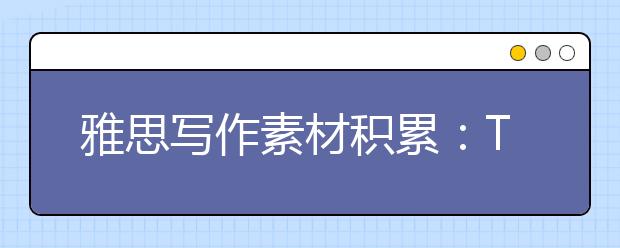 雅思写作素材积累:TV and Films利弊
雅思写作素材积累:TV and Films利弊
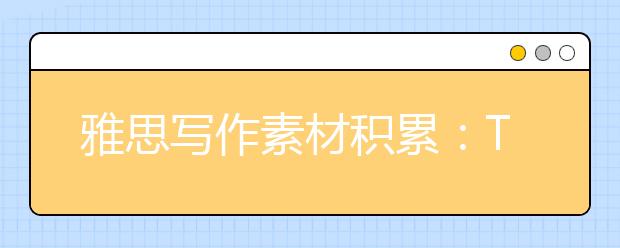 雅思写作素材积累:TV and Films利弊
雅思写作素材积累:TV and Films利弊
 雅思口语Do you like watch films 如何回答
雅思口语Do you like watch films 如何回答
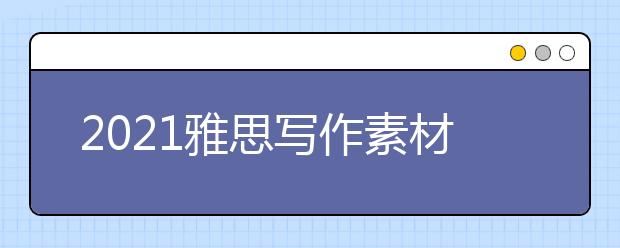 2021雅思写作素材之TV and Films利弊
2021雅思写作素材之TV and Films利弊
 雅思口语Do you like watch films 如何回答
雅思口语Do you like watch films 如何回答
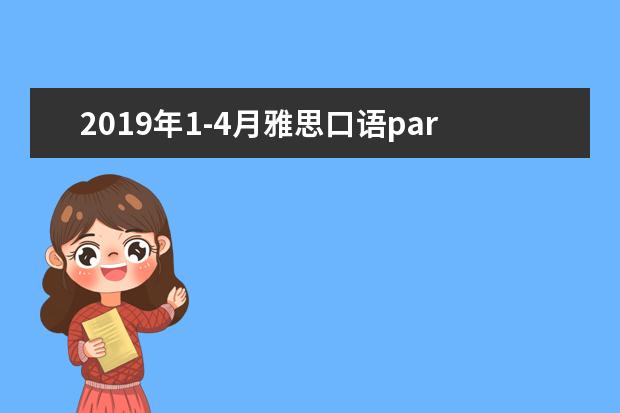 2019年1-4月雅思口语part1题库:Films/Movie stars
2019年1-4月雅思口语part1题库:Films/Movie stars
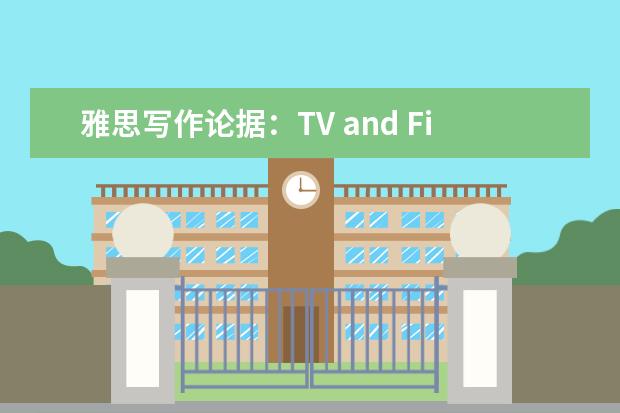 雅思写作论据:TV and Films
雅思写作论据:TV and Films
 films
扩展资料
films
扩展资料
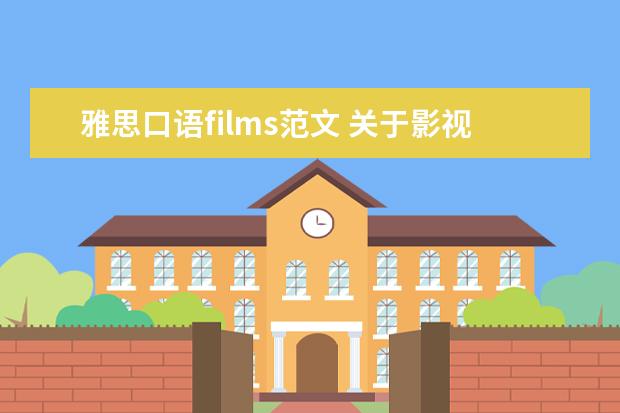 雅思口语films范文 关于影视的英语口语翻译
雅思口语films范文 关于影视的英语口语翻译